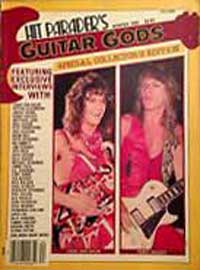Alex Lifeson: Rushing Ahead
Cerebral Approach Aids Rush's Guitar Great
By Andy Secher, Hit Parader's Guitar Gods, Winter 1984, transcribed by pwrwindows

Alex, how has your role in Rush changed over the years?
When we started we were a conventional hard rock band. We had a lot of solos, and a fairly undisciplined approach. Over the years we've become far more exacting with our style, and that's true for my guitar playing as well. On our more recent albums, I prefer to work totally within the confines of a particular song. I have no desire to overplay, even if I think I can play an exciting solo. At one time I wanted the spotlight; now I'm quite satisfied to be a part of the overall sound.
How close do you stay to your studio playing in concert?
It depends on the song. On some of the older tunes, I have a lot more freedom than on the newer songs. The material from Signals is quite structured, and I try to stay relatively close to the stuff I played on the album.
If you had a choice, would you prefer to have more freedom on stage, or do you enjoy the regimentation of the band's more recent music?
Sometimes I find it a bit regimented, but I'm very happy with my role in Rush. If I wanted to inject more solo time into the set, I imagine I could, but I have absolutely no desire to do so. I'm totally committed to Rush's musical philosophy.
Does that mean that you'd never consider doing a solo album?
As a matter of fact, I'm thinking of doing a solo project at the moment. It has nothing to do with my commitment to Rush. Rather, all three of us would like to try something a little different. Geddy Lee is also planning an album, and his would be very progressive, with a lot of keyboards. Mine would, naturally, be very guitar-oriented. It would allow me to try some of the new things that I just can't try with Rush. Neil Peart doesn't have any album plans, but he wants to work on a book of poetry.
Rush is a band that seems to always defy categorization. Do you ever worry that the changes the band is constantly undergoing won't be accepted by the fans?
Of course. We've grown to enjoy the relationship we have with our fans. They give us the freedom to experiment and grow, and in return we give them the best music we can. I worry, however, that one day we'll do something that they won't react to positively. But I believe you can be experimental as long as what you produce is of quality.
Do you find it surprising that despite all your changes and experimentation, the vast majority of your audience remains the hard rock fans who got into the band years before?
Not really, because no matter what we do, we're still very much a rock and roll band. We're still a guitar/ bass/drums band, so that simple, direct sound is still at the core of our music, no matter how complicated we may make a particular song.
With Geddy becoming more and more enamored with keyboards, do you find yourself forced to assume more rhythm guitar duties on stage?
To a degree, yes, but Geddy's keyboard style seems to incorporate a lot of the riffs he'd play on bass. He has a very rhythmic style. When he plays that way, I feel no restrictions at all. When he plays lead, though, I naturally have to assume more rhythm responsibilities.
Is Rush still exciting for you, or has the success made you at all complacent?
It's more exciting than ever. We're creating music that's challenging and adventurous - both to listen to and play. I've never enjoyed myself more.